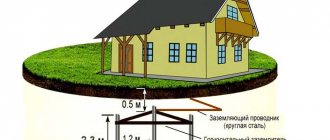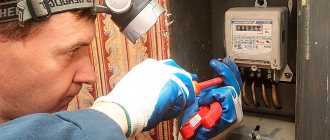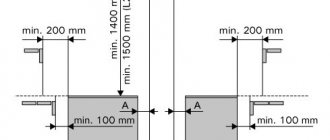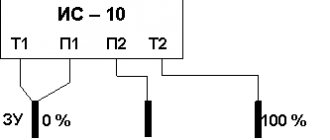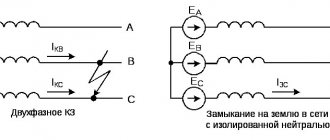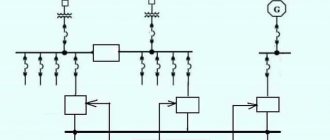Activities related to the operation of power plants and networks belong to a high-risk group
- Document status and scope of application
- Order structure
Activities related to the operation of power plants and networks belong to a high-risk group. This is due to the action of several factors that pose a potential danger to the health and even life of personnel. Their list includes:
- danger of electric shock;
- the possibility of mechanical damage to the skin, organs and tissues when operating faulty equipment;
- falling from a height during maintenance and repair of networks and installations;
- exposure to increased levels of electric and magnetic fields;
- risk of static electricity;
- risks caused by objects falling from a height;
- the impact of increased temperature of individual elements of networks and stations;
- other factors.
To minimize these risks, regulatory documents are being developed at the federal level that define the basic procedures for carrying out work in this area. For this area, such a document is Order of the Ministry of Energy dated June 19, 2003 N 229, which establishes the rules for the technical operation of power plants and networks in our country.
Organization of technical safety
Technical safety of production processes is the most important element and necessary aspect of any work activity. In terms of ensuring supervision and control during network maintenance, strict requirements for compliance with labor safety standards are applied. For industrial production, railways, organizations engaged in the maintenance of electrical equipment and supplying energy to consumers, the development and establishment of such rules is of a special nature, since the personnel of such institutions are daily exposed to the danger of significant harm and damage to health.
A training manual on the correct handling of electrical installations in an enterprise
At the federal level, practical and methodological recommendations have been developed on compliance with safety rules and operation of installations with high electrical voltage. Also, one of the legal requirements is the adoption of internal local regulations in the field of rules for the technical operation of power plants and networks. This is a complex of internal documentation that forms a single unit in the field of control, training activities, and supervision of work. Such an act is prepared on the basis of industry legislation, taking into account the specifics of the activities of an individual enterprise. Compliance with this set of measures is required of all company employees without exception.
Important! Checking the availability of such documentation, as well as the procedure for its correct implementation, is the responsibility of the state labor protection service. During inspection activities, such an inspection identifies violations and issues orders to eliminate them, and also imposes punishment in the form of an administrative fine.
Procedure for operating live networks
Safety precautions
General rules
- Personnel must comply with established safety rules.
- The launch of diesel power plants is prohibited if there is a suspicion of danger.
- If the equipment is damaged, hazard warning signs must be posted and the battery cable must be disconnected.
- Repair work can only be carried out with the battery cable disconnected.
Installation of diesel power plant
- Observe grounding requirements during electrical installation work.
- Check that the fuel supply system complies with the established standards.
- Check the presence of protective thermal insulation on the exhaust system and muffler.
- To climb onto the body, use only special devices.
- Check the serviceability of the lifts.
- Make sure there are no people between the crane and the diesel engine when lifting.
Fire and explosion safety
- Check for fire extinguishers.
- Check the quality of ventilation.
- Clean up spills of fuel and other liquids in a timely manner.
- Do not smoke near fuel or batteries.
- Do not refuel with the engine running.
- Stop the diesel engine when there are leaks and turn it on only after they have been completely eliminated.
Mechanical influences
- It is prohibited to operate diesel power plants in the absence of a protective fence.
- Keep fingers, hair, and loose clothing away from moving parts of the equipment.
- The doors of the installation compartments must be closed when starting the diesel power plant.
- Avoid direct contact with oils and other liquids.
- You must wear protective clothing and a helmet.
Chemical influences
- Avoid direct contact with skin and contact with mucous membranes of all liquids used in DES.
- Replace protective clothing if fuel or oil comes into contact with it.
- Use a protective mask, goggles and apron.
Noise impact
- Long-term exposure to noise levels exceeding 85 dB is harmful to health.
- Use earplugs if you do not have a noise-reducing hood.
Electrical impact
- Work on diesel power plants should only be carried out by trained personnel.
- It is necessary to check the grounding at every start.
- Connecting or disconnecting the load can only be carried out with the diesel power plant turned off and the battery terminal disconnected.
- Do not touch live parts.
- Check the compliance of the electrical characteristics and power when connecting the diesel power plant to the load.
- During maintenance, you need to make sure that the equipment is de-energized.
- Check wires and insulation system for damage.
- In case of fire, fire extinguishers BC or ABC should be used.
Technical documentation
Safety rules for operating electrical installations
To correctly implement the PTE rule at any enterprise, regardless of the specifics of the activity, it is necessary to know the characteristics of objects that are under constant voltage. Objects such as a power plant, reservoir, power plant, electrical installation, special-purpose electrical equipment depend on both the rate of energy production and, accordingly, the presence of dangerous voltage, as well as the measures being developed to neutralize the negative consequences.
When drawing up a special action plan, technical documentation is also developed, which, in addition to a detailed description of the operating principle and design of energized systems, includes possible technical malfunctions and ways to solve them, as well as measures in the event of an abnormal or emergency situation.
Typical High Voltage Electrical Installation
Training and professional development
Rules for labor protection during operation of thermal power plants
An integral part of preserving and maintaining a safe level of work activity in production is the constant training of enterprise workers in the provisions and requirements of legislation in the field of labor protection. Such training is usually carried out in specialized educational institutions that have appropriate certification in this field.
However, in some cases, if the company has a certain staff of employees with the appropriate level of knowledge, such training is carried out on the job without interruption from direct work activity.
Commissioning of energy facilities
When carrying out a construction, repair or maintenance procedure, the final point is the commissioning of such a facility. This procedure involves several stages in addition to the construction itself and requires mandatory documentation of each of them.
Commissioning works
Rules for labor protection during the operation of industrial transport
When constructing a new facility, commissioning work is mandatory, which is associated with an increased danger of such installations, since the launch of work processes occurs for the first time.
Note! During the execution of this promotion, it is necessary to adhere to the entire range of security measures.
Test procedure
Testing of installations is carried out only if there is control and supervision by company officials with a certain electrical safety category, who are directly responsible for the work performed. Moreover, such work is carried out with the mandatory use of all primary protective equipment and special equipment.
Carrying out preventive measures at the station in compliance with operating rules
Acceptance (final stage)
The final stage of commissioning a new station is its acceptance. Such a procedure is formalized by a special act, in which the parties indicate the circumstances of construction or repair, identified defects and can reflect a special opinion if there are disagreements. After signing, all technical information about the facility and the features of its operation are transferred with a description of hazardous production factors and safety equipment used during its maintenance.
Exploitation
Before starting up the diesel power plant, you need to carefully check the equipment and its readiness for operation.
Operating rules
Every 250 engine hours, the following activities are carried out:
- daily TO and TO-50 and topping up the battery with distilled water (as needed);
- replacing oil filters and oil;
- load tests;
- checking the functionality of the gas exhaust system and cleaning it (if necessary).
Every 500 engine hours, the following activities are carried out:
- daily TO, TO-50 and TO-250 (the same work is performed every 750 engine hours);
- flushing the cooling system and replacing the coolant, but at least once a year;
- checking and cleaning air and water radiators;
- replacing air and fuel filters.
Every 1000 engine hours, the following activities are carried out:
- daily TO, TO-50, TO-250 and TO-500.
Every 2000 engine hours the following activities are carried out:
- replacing fan belts, without taking into account their condition (except for engines of the 4000 series, on them this work is performed every 5000 operating hours).
Technical characteristics of existing stations
Operating stations have a wide variety of characteristics, ranging from rated power to dimensions. When servicing electrical installations, the main factor is the network voltage, which determines not only the list of equipment used, but also the degree of danger to humans:
- Stations up to 1000V pose less of a threat and, in the event of electric shock, most often cause non-fatal harm to health;
- Installations with voltages over 1000V require strict adherence to all precautions, since in the event of an impact they most often lead to the death of the victim.
Modernization, repair and maintenance
In the course of its activity, any industrial equipment eventually requires a repair or modernization procedure. To implement this, the company must also have technical documentation of these facilities and a list of preventive measures. Such measures indicate protective equipment, the use of additional tools, a reference to compliance with PTESS rules, the hazard status of such an object and other characteristics that may create a danger when performing certain work.
Monitoring the operation of diesel power plants
When operating a diesel power plant you need to:
- check the readings of control devices;
- replenish fuel;
- pay attention to changes in the noise level, the appearance of knocking and other extraneous sounds in the equipment;
- monitor and regulate the rotation speed (if an automatic system is not installed);
- check generator vibration;
- control changes in noise in bearings and their heating temperature;
- regulate the voltage frequency;
- check the performance of the rotor and brush apparatus;
- Replace supply chains if they are damaged.
Watch a video on this topic
Departmental supervision of power plants and networks
State bodies and, above all, Rostechnadhor, constantly monitor enterprises that service complex electrical equipment. The inspection is carried out for compliance with safety standards, correct maintenance and repair work, knowledge of staff of regular departments and the availability of special documentation.
Note! If violations are detected, government officials can impose fines and also suspend the organization’s activities until the shortcomings are corrected. In addition, such citizens can hold corporation officials accountable for various types of liability.
Repair work with electrical appliances at high voltage stations
When carrying out departmental control, the employer is obliged not to create obstacles and to provide all necessary information within the competence of Rostechnadzor.
As a result, compliance with the rules for the technical operation of power plants in accordance with federal and industry regulations significantly reduces the risk of negative consequences in the form of equipment breakdowns and harm to the health of citizens.
Power plants and networks, electrical equipment
Section PTE SO 153-34.20.501-2003 discusses:
- generators and synchronous compensators;
- electric motors;
- power transformers;
- reactors;
- voltage distribution devices.
The requirements for the technical operation of each item are considered from the point of view of safe, reliable and long-term operation.
Electrical requirements

